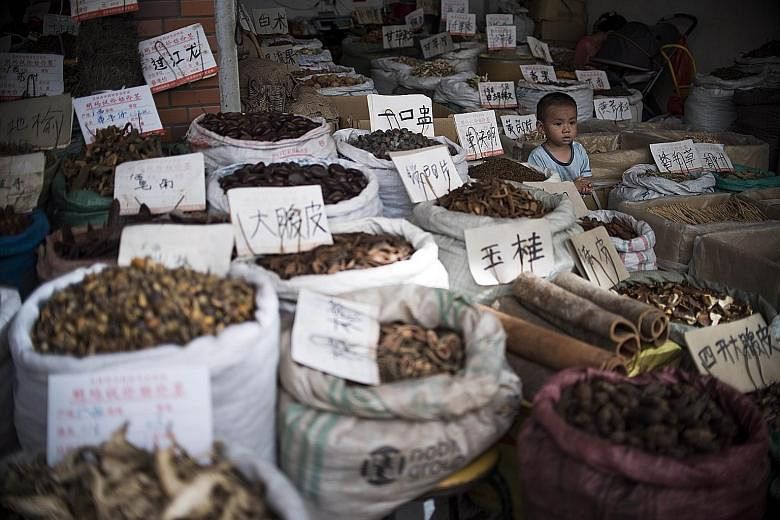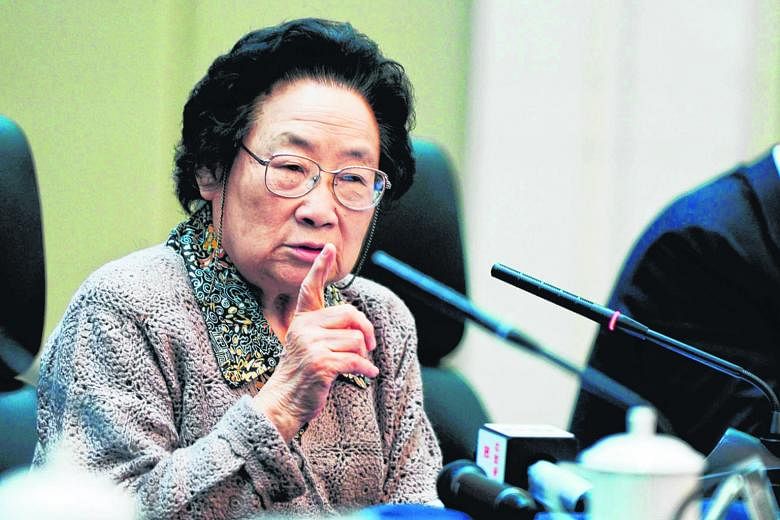BEIJING • China's Tu Youyou collects her country's first Nobel Prize in medicine next week for extracting an anti-malarial drug from a herb mentioned in a traditional text, but her award has prompted debate over the role of science in traditional Chinese medicine (TCM).
Ms Tu derived the compound artemisinin from sweet wormwood, which she found cited in a 4th-century TCM document as a fever treatment. The discovery helped to develop a crucial weapon in the fight against malaria.
Traditional medicine is a source of cultural pride, with Premier Li Keqiang hailing Ms Tu's discovery as "a great contribution of TCM to the cause of human health".
But Nobel committee member Hans Forssberg said "it's very important that we are not giving a prize to the traditional medicine", stressing that the award was only for scientific work inspired by it.
TCM is based on a set of beliefs about human biology, including the existence of a life force, "qi", and that illness is the result of "imbalances" between the five elements - fire, water, earth, metal and wood - in the system. The respected scientific magazine Nature has described TCM as "largely just pseudoscience, with no rational mechanism of action for most of its therapies", calling them an "arcane array of potions and herbal mixtures".
In contrast, Ms Tu chemically extracted the active ingredient of a single plant in isolation.
"Many fear that the recent Nobel Prize, which celebrates Westernised Chinese medicine, will end up doing more harm than good for authentic traditional medical practice," said Mr Lan Jirui, who has a TCM private practice in Beijing.
Describing her research as a victory for TCM was "reckless", said the state-run China Daily, arguing it would encourage Westernised reforms that ignore traditional theories about the body as a holistic system.
"You should not use Western science to 'cure' Chinese medicine," Mr Lan said. "The scariest thing is to lack confidence in your own traditions, to allow others to 'update' you, and then destroy what you had," he added.
Some researchers are looking for active ingredients in TCM components, though Ms Tu failed to find other such drugs. "It's good to look into ethnopharmacology," said Mr Tai Ping Fan, head of the University of Cambridge's Chinese Medicine Laboratory.
"Medicine has evolved since the dawn of humanity, and science," he added. "We need to have evidence. But there's the possibility now, thanks to science, to begin to discuss this problem, how we can see East and West come together."
TCM is an enormous industry in China, with a total value in excess of US$91 billion (S$128 billion) in 2013, a third of the total output of the country's medical industry, said China's Xinhua news agency.
Even though most health facilities in China use orthodox medicine, national healthcare guidelines released in May said every county and municipality should seek to have a dedicated TCM hospital by 2020.
But specialists say there is an internal contradiction between the nationalism involved in bolstering TCM and TCM's claims of universal applicability.
Said anthropologist Volker Scheid of London's University of Westminster, who has studied TCM for 30 years. "I'd say 95 per cent of Chinese would think that I cannot be a very good TCM practitioner because I'm not Chinese but, at the same time, China wants to make Chinese medicine global.
"If you want to make it truly global, you have to take it away from China."
AGENCE FRANCE-PRESSE


